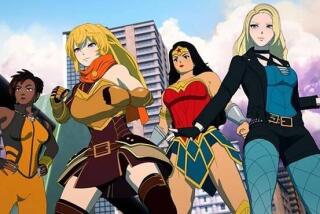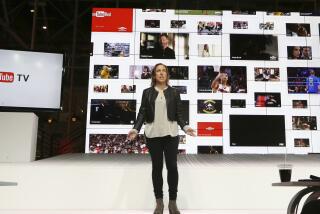Viacom defends online strategy
- Share via
Viacom Inc.’s chief executive Tuesday defended the company’s get-tough tactics with Google Inc.’s YouTube video-sharing website, saying that the unauthorized posting of clips from Viacom shows not only cost Viacom advertising dollars but put the material on a platform that made some advertisers uncomfortable.
When several months of negotiations between Viacom and YouTube broke down in February, Viacom demanded that YouTube remove from its site 100,000 video clips containing content from Viacom’s MTV, Comedy Central and Nickelodeon cable networks. Soon after the notice went out, “we found traffic increase on our own sites,” Viacom CEO Philippe Dauman told attendees at a Bear Stearns Cos. investment conference in Palm Beach, Fla.
Clips from younger-skewing shows such as Comedy Central’s “The Daily Show” and “The Colbert Report” are understandably popular with the youthful demographic that YouTube attracts, Dauman said, but Google and YouTube “thought they would take it first and talk to us later.”
“That was hurting us,” he added. “It was devaluing our core currency.”
After failing to reach an agreement with YouTube over the use of its content, Viacom last month struck a deal with Joost, a fledgling online video site created by the founders of Internet telephone service Skype. Dauman said the Joost deal would enable Viacom to “show our content in an environment that we control” and that brings traffic back to Viacom’s own Internet sites.
A problem with YouTube, Dauman said, is that professionally produced content gets displayed side by side with homemade, and sometimes bizarre, video clips.
“Premium advertisers are not going to pay a lot for [video clips of] a cat going to the bathroom,” Dauman said.
Dauman, during a half-hour presentation at the conference, also said he had asked Brad Grey, chief of Viacom’s Paramount studio, to help the company create a stronger brand identity for movies produced under its MTV and Nickelodeon names, as Walt Disney Co. has done for its films.
The company also is attempting to draw consumers deeper into its products by using its online sites to enhance its cable-network shows. For example, MTV’s “Laguna Beach” now has what Dauman called a “virtual world” on the Internet where fans can interact with the characters.
“They get more and more immersed in that experience, and it’s a great environment for our advertisers,” he said. Besides creating such content, Dauman said the company was making sure that its ad salespeople understand the Internet spinoffs and “can sell that entire connection” to advertisers.
*
More to Read
The biggest entertainment stories
Get our big stories about Hollywood, film, television, music, arts, culture and more right in your inbox as soon as they publish.
You may occasionally receive promotional content from the Los Angeles Times.










